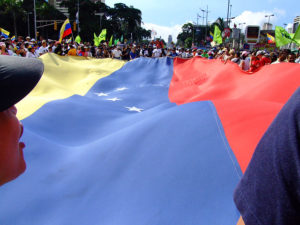Protests Rage Against Colombia’s Economic Policies
Students and labor unions armed with pots and pans marched alongside miners, truckers, coffee growers, milk producers and potato farmers in a general strike in Colombia on Thursday, where hard laborers have to endure such difficulties as high fuel prices and free trade agreements that farmers say have brought them to the edge of bankruptcy.
Students and labor unions armed with pots and pans marched alongside miners, truckers, coffee growers, milk producers and potato farmers in a general strike in Colombia on Thursday, where hard laborers have to endure such difficulties as high fuel prices and free trade agreements that farmers say have brought them to the edge of bankruptcy.
The protests began Aug. 19. Demonstrators joined striking miners to block some of the country’s main highways. The Guardian reported that at least one protester and one policeman died midway through the demonstrations Thursday. Inter Press Service counted two rural demonstrators dead and at least 250 people arrested. Among them was the head of the Fensuagro agricultural trade union, Huber Ballesteros.
President Juan Manuel Santos tried to play down the importance of the demonstrations, saying the “supposed national farmers’ strike does not exist.” He was forced to apologize for the remark, and subsequently sent out high level officials to open negotiations with different sectors.
“We recognise that the farmers’ protests respond to real needs and problems. We are listening to them and offering solutions,” the president said Wednesday night.
The Mesa de Interlocucion Agropecuaria Nacional, a national umbrella protest movement, presented a list of demands before a miners’ strike began. It called for solutions for the farmers’ crisis, including “access to land titles proving ownership; recognition of protected campesino territories; participation in decisions involving mining industry activity; guarantees for exercising political rights; and social spending and investment in infrastructure like roads in rural areas,” Inter Press Service reported.
— Posted by Alexander Reed Kelly.
Your support matters…Inter Press Service:
Since Monday Aug. 19, small farmers around the country have been on strike to protest that they cannot compete with low-price food products imported under free trade agreements with the United States (in effect since May 2012) and the European Union (in effect since Aug. 1). They are also complaining about rising fuel, transport and production costs.
Another target of the farmers’ protests is “Resolution 970”, passage of which was required by the U.S.-Colombia FTA, which protects genetically modified seeds under intellectual property rights, making the replanting of them a crime.
In addition, they are protesting large-scale mining projects that have been given the green light in agricultural regions, without consulting local communities as required by law.
Independent journalism is under threat and overshadowed by heavily funded mainstream media.
You can help level the playing field. Become a member.
Your tax-deductible contribution keeps us digging beneath the headlines to give you thought-provoking, investigative reporting and analysis that unearths what's really happening- without compromise.
Give today to support our courageous, independent journalists.






You need to be a supporter to comment.
There are currently no responses to this article.
Be the first to respond.